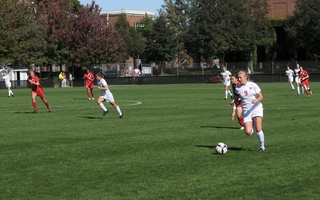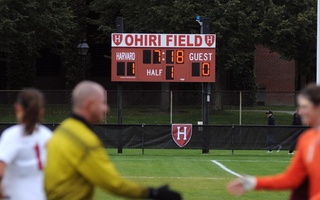On Oct. 1, 1960, Nigeria formally severed with the British Empire following 160 years of colonial rule, and soon thereafter appointed Nnamdi Azikiwe its head of state. As fanfare and festivities erupted that week in the city of Lagos, roughly 30 Nigerian students attending universities in the Boston area celebrated remotely, alongside then-Harvard undergraduate Chukwuma B. Azikiwe ’63, son of the man who would soon take the helm of the most populous nation in Africa.
Around the world, heads turned toward the sovereign nation in its infancy—especially Harvard’s. Earlier that spring, Harvard was one of about 20 American colleges to lay the groundwork for the Nigerian-American Scholarship Program, a year-long pilot project that provided four-year scholarships to two dozen Nigerian students who enrolled in universities across the U.S.
Harvard Director of Admissions David D. Henry ’41 flew to Nigeria in June of 1960 to hand-pick the students who would be granted admission.
RISING STARS
The students Henry selected rose to prominence both at Harvard and in Nigeria.
Christian L. Ohiri ’64—a varsity soccer star who still holds school records for all-time goals, goals in a game, and consecutive games with a goal—was chosen that year. After Ohiri’s untimely death in 1966, Harvard’s soccer stadium was named after him.
Ohiri was one of the first participants in what would become the African Scholarship Program of American Universities (ASPAU), an initiative to provide higher education for people of the increasing number of independent African countries. The program ran from 1961 to 1975, and facilitated full scholarships to American universities for 1,600 African students.
“There was this notion that African countries would be less dependent on colonial powers and become their own bosses,” said Seamus P. Malin ’62, a former Harvard admissions officer who was a senior midfielder when Ohiri joined the varsity team as a sophomore.
“Student exchange was a way to help train for the future—that was very much the inspiration,” Malin said.
Ohiri played for the Nigerian Olympic soccer team at the 1960 games in Rome, where he scored two goals during the qualifying rounds. He had also qualified for the Olympics in the triple jump—which he turned down to focus on soccer—but would go on to be one of the most decorated track and field athletes in Harvard history, holding the triple jump record for four decades. “He was a phenomenon,” Malin said.
Though Ohiri and the other Nigerian recruits were not the first students to attend Harvard from Nigeria—Malin said he recalls admits in the classes of 1954 and 1959—there was an expectation that the handful of African students selected each year would return to their home countries to become political and intellectual leaders.
Zacchaeus O. Okurounmu ’63—now known as Olufemi Okurounmu—one of the other Nigerian students selected by Henry, graduated Phi Beta Kappa with a degree in engineering. In an interview with The Crimson immediately following Nigerian independence in 1960, Okurounmu said that his academic interests were fueled by “much need” for Nigerian expertise in infrastructure. Okurounmu subsequently served as a Senator in the Nigerian legislature.
BRAIN DRAIN
But in the 1970s and ’80s, returning home was not the typical trajectory for Nigerians educated in the U.S.—who tended to leave permanently and raise their children in the United States, leading to a significant brain drain—according to Jacob K. Olupona, a professor of African and African American Studies and an expert on Nigeria.
At the same time, the Nigerian government sponsored scholarships to students to study abroad in the U.S. and the United Kingdom, according to Oludamini D. Ogunnaike ’07, a second-year Ph.D. student in the African Studies department. One consequence of this program was that most current undergraduates with a connection to the country are Nigerian-American; Ogunnaike’s own father attended the University of Wisconsin on a scholarship provided by the Nigerian government.
Read more in News
A Blank SlateRecommended Articles
-
Laxwomen Cruise Past Eagles; Joslin Scores Four in 15-2 WinNo contest. That is what took place yesterday at Ohiri Field as the defending Ivy League champion Harvard women's lacrosse
-
Laxmen Explode At OhiriTick tick tick tick tick tick tick tick... The Harvard men's lacrosse team has not had a great year, to
-
Rain Dampens Pre-Game EventsRainy weather has thrown a kink into the festivities leading up to Saturday’s Harvard-Yale Game, prompting the cancellation of yesterday’s
-
SPORTS BRIEF: Women’s Soccer Game PostponedA year ago, the Harvard women’s soccer team stomped on Fairfield, 4-1, at Ohiri Field.
-
 Sheeleigh Proving To Be An Excellent Student-Athlete
Sheeleigh Proving To Be An Excellent Student-Athlete -
 Poignant History Lies With Soccer Field
Poignant History Lies With Soccer Field













